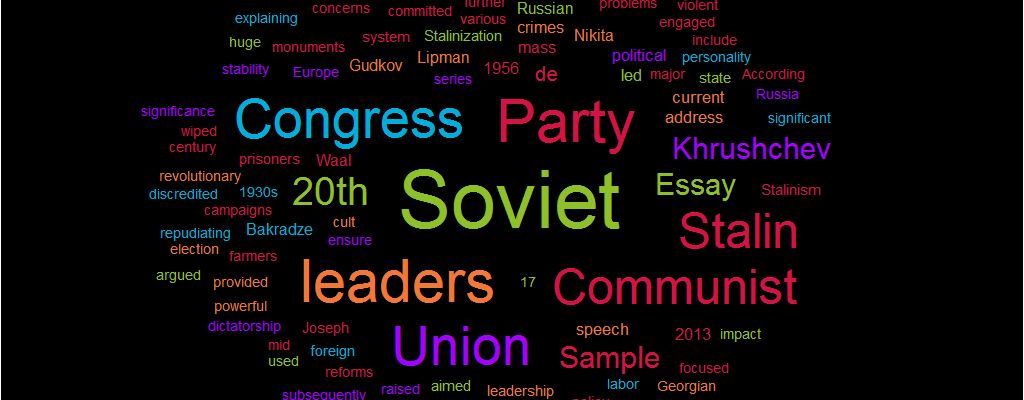Sample Essay: 20th Congress of the Communist Party of the Soviet Union
Publication Date:

Nikita Khrushchev provided a powerful speech during the 20th Congress of the Communist Party of the Soviet Union in 1956. The address focused on denouncing the dictatorship of Georgian revolutionary Joseph Stalin and subsequently disparaging his personality cult. Khrushchev aimed at repudiating Stalinism in the Soviet Union by explaining various major crimes committed by Stalin which had a significant impact on the stability of the Soviet Union. The speech discredited Stalin’s rule and replaced it with Khrushchev’s control which led to the election of a new Congress committee. The address has huge significance to not only the Soviet leaders in the mid-20th century but also the current leaders in Russia.
According to Khrushchev, Stalin was a violent and despotic individual who brought intense purges that almost wiped out the Community party’s political leadership in the 1930s. He argued that Stalin used summary executions and coerced confessions against several leaders. Among them include odious falsification in the case of Comrade Eikhe whose rights were violated (Nikita, 1956, p. 5). Khrushchev further added that Stalin sent millions of civilians to forced labor camps with inhumane deprivation of the social and economic freedoms. Stalin’s dictatorial leadership led to mass repressions against activists after the 17th party congress (Nikita, 1956, p. 4). Other crimes include mass deportation of farmers, Stalin’s roles in 1930s famines, and mass arrests and execution during the great terror in 1937.
The later Soviet leaders engaged in a series of de-Stalinization aimed at correct problems brought by Joseph Stalin. The leaders led by Khrushchev led de-Stalinization campaigns to release the convicted prisoners and political crimes individuals in the Soviet Union (De Waal, Lipman, Gudkov & Bakradze, 2013, P. 17). The leaders greatly condemned the tyrannical regime and engaged in negations with countries such as Ukraine regarding compensation of deported farmers and executed prisoners. There was an emergence of several reforms aimed at removing the Stalinist political system and Gulag labor-camp system. Congress developed a collective leadership plan which incorporated many leaders. Similarly, the leaders triggered amnesty degree in prisons, destroyed Stalin’s monuments, renamed buildings associated with Stalin, and ultimately changed the country’s foreign policy.
The current Russia leads would react by consolidating the Russian state to put to an end political turmoil in the country. According to De Waal, Lipman, Gudkov & Bakradze (2013), post-soviet led a series of efforts to radically delegitimize the Communism regime (17). However, the leaders can address concerns raised in Khrushchev by compromising with communist leaders to create a centralized political system. President Vladimir Putin among other leaders should enhance foreign policy by accommodating neutral countries to have a better relation in Europe. In addition, the Russian leaders should be motivated to restore unity and cooperation among various kinds of leaders to eliminate the instance of Stalinism in the current Russian state. The leaders should also ensure official rhetoric condemnation of Stalinism is controlled (De Waal, Lipman, Gudkov & Bakradze, 2013, P. 20).
In general, Khrushchev’s speech became a significant cornerstone which shaped the current Russian state. The address greatly condemned crimes committed by Joseph Stalin which included mass deportation, killings, and wiping of leaders which almost killed the Communist party. The problems created has however been managed through the release of prisoners, destroying Stalin’s monuments, and drafting new foreign policy. The current leaders should further carry out de-Stalinization campaigns to ensure more reforms are undertaken to address concerns raised in Khrushchev’s speech.
References
De Waal, T., Lipman, M., Gudkov, L., & Bakradze, L. (2013). The Stalin Puzzle: Deciphering post-Soviet public opinion. Carnegie Europe.
Nikita, K. (1956). Khrushchev’s Secret Speech, ‘On the Cult of Personality and Its Consequences,’ Delivered at the Twentieth Party Congress of the Communist Party of the Soviet Union.